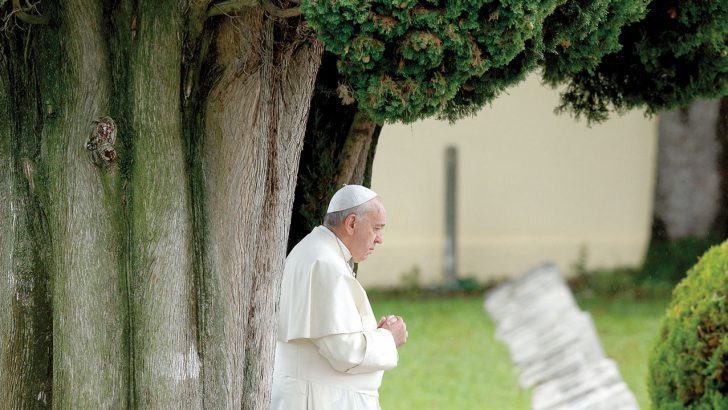Does the Pope vote for a Green party? He clearly is supportive of the Green cause.
I was surprised to turn on BBC radio last Monday morning and hear, at the top of the news programme, not a politician talking about the state of the country, nor a reporter analysing the tragic killing in a Reading park, but a ten-minute address by Pope Francis who spoke about how we must re-make the world, with more environmental awareness, after the lockdown ends.
Francis spoke, as he always does, about compassion for the poor, and the need to take a new approach to the way we organise our world after the the pandemic. “The pandemic caused us to reflect on the relationship between man and the environment,” he said.
Pollution
“The closures reduced pollution and allowed us to rediscover the beauty of so many places free of traffic and noise.”
Now, as activities resume, we must all think more responsibly about caring for the planet, “our common home”. He said he backed calls for environmental action that have emerged throughout the globe.
Francis said we should consume less and be aware of how we affect the environment by the habits of obsessive consumption.
I always listen to the Pope’s pastoral words but I also weigh up the implications of his message. He’s surely right in observing that the slowdown of traffic and frantic consumer activity have benefitted nature, and even awakened us to awareness of the beauty of birdsong, the cleanness of empty skies.
Yet there is a dilemma for reflective Christians. The birds are singing and the skies are empty partly because the aviation industry has collapsed, at least temporarily – along with the jobs of thousands of airline workers.
The Green question, on a philosophical level, is a moral question”
Our world has had too much emphasis on acquisition, but people in poor countries also need to trade, to sell their produce, to feed their families: that is a moral consideration too.
Our consumption can be their bread and butter.
The Green question, on a philosophical level, is a moral question, and Francis is much admired throughout the world for stressing it.
But we also have to seek a balance between responsibility for the planet and the jobs that depend on ordinary commercial activity, ethically pursued.
Let Harry be happy, his way
I wonder if Prince Harry, sequestered in Los Angeles, ever suffers from bouts of home-sickness? Does he ever think ruefully of his family in England, or feel nostalgic about a polo-match, or a game of cricket, which will now be resuming?
Surely it is natural to everyone to have feelings of attachment to their native land?
Harry has chosen to be where his wife wants him to be, and perhaps that is admirably uxorious. However, a new biography of Meghan Markle by the royal writer Lady Colin Campbell portrays Meghan as being the dominant partner in the relationship, as if Harry’s compliance hadn’t much chance against his wife’s strong personality.
Lady Colin says that Meghan was warmly welcomed at Windsor, but she never wanted to fit in with Harry’s family – admittedly, there were annoying protocol restrictions.
Yet similar relationships can occur in any family. There are men who dominate their spouses even to the point of physical bullying or cruel abuse. And there are women who thoroughly dominate their husbands – I’ve known a few, even in my own family.
My mother thought her brothers were hopelessly submissive to their ‘domineering’ wives. Yet there’s no telling what the internal dynamics of a marriage may be, and if Harry is happy doing as his wife tells him – so be it!
The Church was centuries ahead in opposing slavery
Slavery was legally abolished in the 19th Century in the western world after campaigns by conscientious Christians, but five centuries previously, it had been condemned by Pope Eugene IV, in his document Sicut Dudum, issued in January 1435.
Ronald Crane, of the Ordinariate on-line publication The Portal, has sent me a text from this document. Of the colonists who enslaved indigenous people in the Canary Islands, Eugene wrote: “They have deprived the natives of their property or turned it to their own use, and have subjected some of the inhabitants of said islands to perpetual slavery, sold them to other persons and committed other various illicit and evil deeds against them.”
Venetian
Pope Eugene (Gabriele Condulmaro, a Venetian who had previously been a monk) exhorted that all Christians desist from such deeds, that they restore the liberty of “all and each person of either sex” who have been made subject to slavery. “These people are to be totally and perpetually free and are to be let go without the exaction or reception of any money.”
He then issued an excommunication order for anyone who promoted the grave sin of slavery and failed to restore family and freedom back to the native people.
The principle still holds, wherever slavery is practiced.


 Mary Kenny
Mary Kenny Photo: CNS
Photo: CNS 